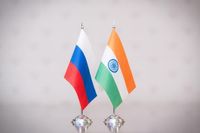On March 19, 2025, in a significant development for Russian language advocacy, Minister of Education Sergei Kravtsov announced the establishment of the Eurasian Association for the Support and Promotion of the Russian Language. This initiative aims to enhance the presence of the Russian language in friendly countries worldwide, fostering a culture of openness in education. Minister Kravtsov stated, "We indeed are opening a center for the Russian language, and today the creation of the Russian language association is a very important step for interaction with friendly countries..."
The association plans to set up centers of open education focused on the Russian language in various nations, capitalizing on the growing interest noted among countries in Latin America, Africa, and beyond. In line with this, each pedagogical university in Russia will partner with a foreign country to facilitate teacher exchanges and enhance the qualifications of educators teaching Russian. As Kravtsov highlighted, "Practical centers for open education in the Russian language have been created in practically all friendly states, and we have a roadmap for ongoing collaboration with each country." This robust framework marks a new era focused on cultural exchange and international cooperation.
However, while these efforts take shape, India presents a contrasting scenario. The University of Pune has a long-standing tradition of offering Russian language courses since the Soviet era; nonetheless, interest has significantly declined over the last decade. Gagan Patwardhan, an Indian entrepreneur and member of the Society of Indian-Russian Friendship, shared insights regarding this trend during an interview. He revealed, "Students often view studying a foreign language as additional education... and there has been a decline in interest in Russian because its utility for employment is not clear compared to German or French."
At the University of Pune, enrollment figures in Russian language courses have dropped to about 20-25 students annually, starkly contrasted with nearly 100 students studying German. Patwardhan pointed out that economic dynamics play a pivotal role in this attrition. He stated that students are inclined towards languages that open up viable job prospects, with countries offering opportunities to work in both India and overseas being more alluring. "If we look at German or French, those countries actively recruit professionals and provide avenues for students to remain working post-study," he explained, underscoring the practical influences shaping student choices.
Alarmingly, Patwardhan noted that the need for skilled Russian translators is on the rise in sectors such as IT and tourism, suggesting a disconnect between supply and demand in skilled professionals. He advocates for introducing a year-long translator qualification program that would enable students to enhance their employability. "Having a diploma in translation could immensely improve a student’s job prospects," he suggested, reflecting the pressing need for qualified translators in India.
To counteract the downward trend, Patwardhan believes that reinvigorating interest in the Russian language hinges on deploying qualified Russian teachers to India. He said, "It is essential; we face a critical shortage of qualified Russian language instructors. I would love for teachers from Russia to visit us, even for three to six months, to help bridge the gap in instructional quality and provide students with native conversation practice. Their presence would ignite student interest significantly."
Furthermore, initiatives aimed at raising awareness of the benefits of learning Russian in schools must be prioritized. Last year, the Maharashtra state government introduced a program that includes Russian among foreign languages taught in schools, offering a new platform for engagement with the language from an early age. Patwardhan noted, "There is a movement beginning, and I believe it will only grow." This could potentially lead to a new generation familiar with the language before arriving at university.
Despite these efforts, challenges remain. Over one million Indian students travel abroad for education each year, with the vast majority opting for English-speaking countries—a trend driven by the ease of transition and post-graduation work opportunities. Patwardhan pointed out, "80% choose to study in countries where they are comfortable with the language, and they are inclined to stay and work there." This reality presents further hurdles for promoting Russian education in India.
Minister Kravtsov emphasized that the success of the new association will depend heavily on collaborative partnerships across various educational landscapes. He opined, "It's crucial to work closely with schools in those countries where Russian is studied, ensuring that the language thrives amidst rising global competition." This sentiment resonates strongly within India as educators rally to revitalize interest in the Russian language among the youth.
Ultimately, the promotion of Russian culture and language constitutes a vital part of enhancing educational ties, with cultural exchanges, literature, and artistic exhibitions viewed as essential tools in attracting student interest. In the spirit of fostering both cultural appreciation and language instruction, the future of Russian language education remains dependent on innovative approaches both in India and abroad. The intersection of effective engagement and educational initiatives could indeed chart a promising course for the Russian language in this global landscape.





